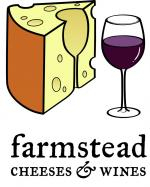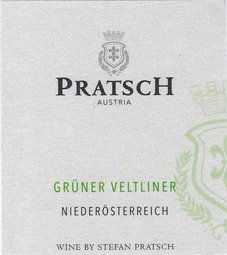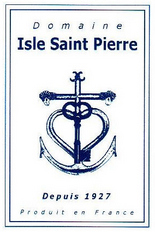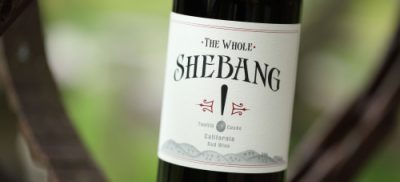Pratsch Gruner Veltliner – Liter – Organic
BODKIN SAUVIGNON BLANC THE VICTOR’S SPOILS – ORGANIC
ISLE ST PIERRE ROSÉ – SUSTAINABLE
Audebert Bourgeuil – Organic
Violet Hill Pinot Noir – Sustainable
Shebang! Red Blend – Sustainable
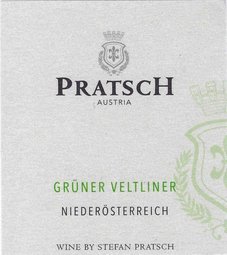 Pratsch Gruner Veltliner – Liter – Organic
Pratsch Gruner Veltliner – Liter – Organic
Pratsch Biohof Pratsch is a relatively small, 35 acre estate comprised of 13 single vineyards in the Niederosterreich region (Lower Austria) all maintained under organic certification for over 10 years by the Pratsch family, Wilhelm and Anneliese and their son, Stefan.
Organic wine growing to them is more than just the elimination of pesticides, fungicides, and artificial fertilizers, but rather part of a larger, holistic philosophy of dedication to the land and the quality of the wines.
On the glacier-formed hills and alluvial soils, the ripening process of the estate-grown grapes is promoted by high, sun-exposed vine trellising, known as the Guyot Double. This tall system combined with the areas winds help cut down the problem of fungal diseases, maintaining dry, unaffected grapes.
Constant hand-pruning and care to the vines are administered in order to further maintain health in the vineyard. Cover crops in and around the vineyards help attract insects and other vine-damaging parasites away from the vines. Natural fertilizers are used to transport nitrogen and other nutrients back to the soils. All of this attention to detail and dedication to the purity of the land by Stefan and the Pratsch family is translated directly into the quality of the wines that are a true reflection of their terroir.
100% Certified Organic Gruner Veltliner. On the nose, this wine is fruit-forward with a touch of apple, peach, and apricot with a slight spice. Fresh and tangy, fine spices, white pepper, and round body.
Best Buy Wine and Spirits and Wine Enthusiast: “Fresh and lively, here’s a wine by the liter to stock up on for summer drinking. It’s limey and herbal with a quenching acidity; for anything doused in chimichurri.” (W&S) “Crisp green pear, a touch of lemon and even some of that much-vaunted pepperiness find their way into this unobtrusive but refreshing white, which also boasts some welcome spritz.” (WE)

BODKIN SAUVIGNON BLANC THE VICTOR’S SPOILS – ORGANIC
Bodkin Wines was founded by Chris Christensen, an Iowa native, in 2011. His passion for aromatic wines and winemaking led him to create America’s first Sauvignon Blanc with bubbles. In 2013, Andrew Chambers, an Oregon native, joined the brand and they purchased 24 tons and made 1,100 cases of their award-winning Sparkling Sauvignon Blanc. Since that time, Bodkin Wines has produced over 15 varietals of wine, eleven of which were scored at 90 points or higher by Wine Enthusiast. They are consistently growing, year after year, but are determined to keep their presence small and unique. Bodkin Wines is still 100% owned by both Chris and Andrew, two guys living and working hard in Sonoma County.
Winemaker Chris Christensen was named “Winemaker to Watch” by the SF Chronicle in 2017, and has been lauded nationally for his work with Sauvignon Blanc. (We’ll be bringing in several of his sparkling SBs soon). He’s one of the few African American winemakers working today, and we are very happy to support him and his family by bringing in the wine.
Winery notes: “Light and approachable, this high flavor-low alcohol wine is perfect to drink all day long and on into the party hour. Pineapple-guava with accents of tangerines and nectarines dominate the flavors and aromas. This wine pairs well with live music, sunny days, fresh cuisine, cool dudes, and hot babes-so it pairs with pretty much the best things in life. The winemaker calls that winning and to the victor go the spoils. Grip and Sip!”
90 points, Wine Enthusiast: This is a delightfully bright, light and refreshing wine, grassy and herbal within a context of textured grapefruit and lime. It’s lovely and complex with great persistence of acidity.
Pair with lighter foods, like fish, salads, or appetizers; or try as a refreshing aperitivo. The mouth-watering acidity of this wine makes it a perfect foil for fattier dishes, so have fun!
ISLE ST PIERRE ROSÉ – SUSTAINABLE
Founded in 1927, Domaine Isle Saint Pierre is located on a small island in the Rhône River. It is run today by fourth-generation vigneron Julien Henry. The proximity to the water provides a cooling influence that allows the wines to retain great freshness even in the far south of France, and deep well-draining sedimentary soils comprised of sand and silt. Because of the terroir and temperature, they are able to grow varietals that thrive in a Continental climate, such as Merlot, Cabernet Franc, Chardonnay, and Sauvignon.
In 2018, the estate received the Vignerons Développement Durable certification in recognition of its commitment to sustainable wine growing.
Isle Saint Pierre is a small island in the Rhône River, located south of Arles and 10 miles away from the Mediterranean in the heart of the Camargue region.
In 1927, Parisian wine merchant Pierre Chassaing founded Domaine Isle Saint-Pierre and devoted himself to cultivating vines and raising sheep. A few vines remain from that time, together with a flock of 200 sheep that provides the manure needed to nourish the vines. The proximity to the water means that the island enjoys a coastal climate (with a cooling influence from the nearby bodies of water) and deep, well-draining sedimentary soils comprised of sand and silt.
Though the estate dates from the 1920s, it wasn’t until 1972 when the next generation set about replanting the vineyard with noble vines grafted onto American rootstock. Because of the terroir and temperature, they are able to grow varietals that thrive in Continental climates. For red wines as well as for the rosé, the main varieties are Merlot, Cabernet Franc, Petit Verdot, Carmenere, and Arinarnoa (a cross between Merlot and Petit Verdot).
Today, fourth-generation vigneron Julien Henry farms sustainably with careful attention paid to the leaf system of the vine. The goal is to achieve the right balance between grape production and the leaf surface exposed to sunlight. Working the soil enables the vines to establish a deep root system, which protects them from Summer droughts. Through careful viticulture and maintaining low yields, the estate is able to harvest its vineyards by the 15th of September before the arrival of the rains which often fall as the season progresses into fall.
Although the Isle Saint Pierre wines come from the very southern stretches of France, they display wonderful freshness and aromatic appeal. At harvest, as soon as the grapes enter the cellar, they are cooled down to retain freshness. The rosé is a blend of Cab Franc, Merlot, Petit Verdot, Arinarnoa, Tannat, Carménère, Syrah.
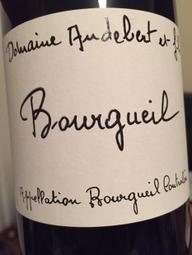 Audebert Bourgeuil – organic
Audebert Bourgeuil – organic
The Audebert family settled in the Bourgueil area in 1839 and now own and farm 100 acres of vineyard in Bourgueil, Saint Nicolas de Bourgueil and Chinon appellations.
Breton specialists, the local term for Cabernet Franc, the Audeberts were discovered by Kermit Lynch who first brought them stardom in the states with sommeliers. Their vines in Bourgueil are planted on a mixture of clay, sand, and limestone with an average vine age of 30 years.
Fermentation is with indigenous yeast in stainless steel. After fermentation, wine is transferred to 600-liter demi-muid barrels where it ages until release.
Like all Loire Valley Cabernet Francs, this wine should be served chilled. That’s right, put it in the fridge for an hour.
Red fruits of black raspberry and cherry meld perfectly with the chalky tones of the soil from which this old vine Cabernet Franc is grown. A lovely citrusy finish tidy’s up a long palate of pure excellence. This red will sing with roast fowl, venison, pork, and all things cheese!
A delicious entry-level Bourgueil; young and brambly, with light herbal notes, possessing a good identity and light enough to have with all sorts of foods.
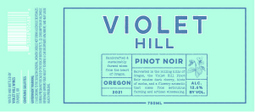 Violet Hill Rogue Valley Pinot Noir – Sustainable
Violet Hill Rogue Valley Pinot Noir – Sustainable
What a find! This lovely light-bodied red comes from the Rogue Valley in Southern Oregon. Stylistically, it splits the difference between Willamette Valley and Californian Pinots. Violet Hill Pinot Noir opens up beautifully once it gets air swirling around in your glass. Look for perfumed dark cherry fruit with a creamy texture, delicate earthiness and elegant finish.
Farmed in an expansive and well-sheltered valley along the Rogue River and its tributaries; the Rogue AVA is bordered by the Cascade Mountains to the east, the Siskiyou Mountains to the south, and the Southern Oregon Coast Range to the West. The AVA is mostly made up of high-elevation sites in mountain country. Despite the ruggedness of the region, the weather is quite mild and warm in the summers making for concentrated and ripe fruit profiles.
Fermented with native yeasts in small batch fermentations, the wine is a representation of the of the people and places that farm and vinify it.
Medium-bodied, with primary aromas of dark cherry, mocha, and floral, that are echoed on the satiny palate, with a bright finish.
James Suckling, 90 points: “Aromas of strawberries, pitted red cherries, hibiscus, and grated nutmeg. Medium-bodied with silky tannins. Pretty red fruit on the palate with a savory, mushroom-tinged character.”
SHEBANG! (SUSTAINABLE)
Sherman and Hooker Shebang is made by Bedrock Wine Company and is a wine crafted from a blend of declassified Syrah, Petite Syrah, and Zinfandel from Bedrock Wine Co., along with selected bulk lots from other small producers.
Shebang is a project by Morgan Twain-Peterson, the son of Ravenswood founder Joel Peterson. Morgan grew up in the world of wine in California. In addition to this project, Morgan also produces tiny amounts of old vine, heirloom red and white blends, Pinot Noir, and Syrah under the Bedrock Wine Co. label. Also noteworthy: Morgan passed the prestigious Master of Wine and has become one of the less than thirty American Masters of Wine!
Sherman & Hooker is named after the two Civil War generals who founded Bedrock Vineyard in 1854. It is a blend of declassified Syrah, Petite Syrah, Zinfandel and friends from Bedrock Wine Co., along with selected bulk lots from other small producers. All of the lots, whether from Morgan or from friends, were aged in French oak, and saw no chips, staves, or other gobbledy-gook. Morgan chose to make the wine a multi-vintage, multi-varietal blend in order to maintain quality at a terrific price point.
Mostly Zinfandel blended with Carignane, Petite Sirah, Mourvedre, Alicante Bouchet, Grenache, Syrah, Barbera and a touch of whites for aromatics. Sourced from several old vine vineyards throughout Sonoma County.
Fermented using native yeasts in stainless steel, and aged in a combination of stainless steel (85%) and French oak (15%)
The informing impulse behind Shebang is to create a wine that is long on deliciousness and low on pretense. We do this by vinifying the wines with the same care and love as the higher end Bedrock wines- picking at respectable sugar levels (not too high!), using only native yeast fermentations, and a trace of good French oak to round things out
It’s a wine that is meant to be the perfect complement to pizza, pasta, burgers, or whatever is on the table. It’s real wine that’s not manufactured or manipulated. The result is a serious bottle of wine with integrity that drinks WAY beyond its price point!
“Morgan Twain-Peterson is one of the most impressive young winemakers I have ever met, and it’s not just because he grew up the son of a famous producer. Making wines at this level requires talent, passion, hard work, and a great palate, none of which is easily inherited. Along with Mike Officer of Carlisle, Twain-Peterson is on a mission to rediscover what he calls California’s old-vine “heritage” vineyards. These historic sites planted by California’s early immigrants, often home to unknown field blends, remain some of the most fascinating vineyards in California. Officer and Twain-Peterson were tired of seeing these old sites gobbled up by industrial-scale wineries, so they decided to do something about it. Bravo.” Antonio Galloni

